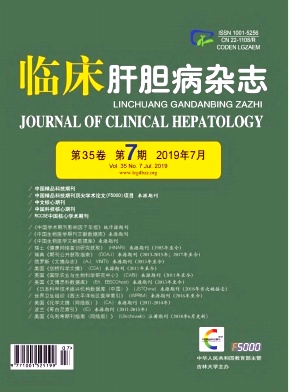|
[1]ROBERTS SE, MORRISON-REES S, JOHN A, et al.The incidence and aetiology of acute pancreatitis across Europe[J].Pancreatology, 2017, 17 (2) :155-165.
|
|
[2]CAVALLINI G, FRULLONI L, BASSI C, et al.Prospective multicentre survey on acute pancreatitis in Italy (Pro Inf-AISP) :Results on 1005 patients[J].Dig Liver Dis, 2004, 36 (3) :205-211.
|
|
[3]GISLASON H, HORN A, HOEM D, et al.Acute pancreatitis in Bergen, Norway.A study on incidence, etiology and severity[J].Scand J Surg, 2004, 93 (1) :29-33.
|
|
[4] HONG W, ZIMMER V, BASHARAT Z, et al.Association of total cholesterol with severe acute pancreatitis:A U-shaped relationship[J].Clin Nutr, 2019.[Epub ahead of print]
|
|
[5]YADAV D, LOWENFELS AB.The epidemiology of pancreatitis and pancreatic cancer[J].Gastroenterology, 2013, 144 (6) :1252-1261.
|
|
[6] TENNER S, BAILLIE J, De WITTJ, et al.American College of Gastroenterology guideline:Management of acute pancreatitis[J].Am J Gastroenterol, 2013, 108 (9) :1400-1416.
|
|
[7]Pancreas Study Group, Chinese Society of Gastroenterology, Chinese Medical Association, Editorial Board of Chinese Journal of Pancreatology, Editorial Board of Chinese Journal of Digestion.Chinese guidelines for the management of acute pancreatitis (Shanghai, 2013) [J].J Clin Hepatol, 2013, 29 (9) :656-660. (in Chinese) 中华医学会消化病学分会胰腺疾病学组, 《中华胰腺病杂志》编辑委员会, 《中华消化杂志》编辑委员会.中国急性胰腺炎诊治指南 (2013年, 上海) [J].临床肝胆病杂志, 2013, 29 (9) :656-660.
|
|
[8] WU S, HUANG Z, YANG X, et al.Prevalence of ideal cardiovascular health and its relationship with the 4-year cardiovascular events in a northern chinese industrial city[J].Circ Cardiovasc Qual Outcomes, 2012, 5 (4) :487-493.
|
|
[9]Joint Committee for Revision of Chinese Guidelines for Prevention and Treatment of Dyslipidemia in Adults.Chinese guidelines for prevention and treatment of dyslipidemia in adults (revised version in 2016) [J].Chin Circulation J, 2016, 16 (10) :7-28. (in Chinese) 中国成人血脂异常防治指南修订联合委员会.中国成人血脂异常防治指南 (2016年修订版) [J].中国循环杂志, 2016, 16 (10) :7-28.
|
|
[10]ZHANG J, YANG YX, ZHANG WL, et al.An epidemiological investigation of dyslipidemia in Shijingshan District of Beijing, China:An analysis of 32 372 individuals undergoing physical examination[J].Clin J Med Offic, 2017, 45 (9) :950-953. (in Chinese) 张婧, 杨玉霞, 张位龙, 等.北京市石景山区32 372例体检人群血脂异常流行病学调查研究[J].临床军医杂志, 2017, 45 (9) :950-953.
|
|
[11] Bureau of Disease Prevention and Control, National Health Commission of the People's Republic of China.Report on Chinese Residents'Chronic Diseases and Nutrition (2015) [M].Beijing:People's Medical Publishing House, 2015. (in Chinese) 国家卫生和计划生育委员会疾病预防控制局.中国居民营养与慢性病状况报告 (2015年) [M].北京:人民卫生出版社, 2015.
|
|
[12] MORAN A, GU D, ZHAO D, et al.Future cardiovascular disease in china:Markov model and risk factor scenario projections from the coronary heart disease policy model-china[J].Circ Cardiovasc Qual Outcomes, 2010, 3 (3) :243-252.
|
|
[13] DING WQ, DONG HB, MI J.Prevalence of dyslipidemia in Chinese children and adolescents:A Meta-analysis[J].Chin J Epidemiol, 2015, 36 (1) :71-77. (in Chinese) 丁文清, 董虹孛, 米杰.中国儿童青少年血脂异常流行现状Meta分析[J].中华流行病学杂志, 2015, 36 (1) :71-77.
|
|
[14]LINDKVIST B, APPELROS S, REGNER S, et al.A prospective cohort study on risk of acute pancreatitis related to serum triglycerides, cholesterol and fasting glucose[J].Pancreatology, 2012, 12 (4) :317-324.
|
|
[15]SIMON P, WEISS FU, ZIMMER KP.Acute and chronic pancreatitis in patients with inborn errors of metabolism[J].Pancreatology, 2001, 1 (5) :448-456.
|
|
[16]WANG AJ, XU S, HONG JB, et al.The comparison of different clinical scoring systems for predicting prognosis in acute pancreatitis based on the revised Atlanta classification[J].Chin J Intern Med, 2013, 52 (8) :668-671. (in Chinese) 汪安江, 徐思, 洪军波, 等.新亚特兰大分类下不同评分标准预测急性胰腺炎预后的价值比较[J].中华内科杂志, 2013, 52 (8) :668-671.
|
|
[17]SCHERER J, SINGH VP, PITCHUMONI CS, et al.Issues in hypertriglyceridemic pancreatitis:An update[J].J Clin Gastroenterol, 2014, 48 (3) :195-203.
|
|
[18]VALDIVIELSO P, RAMIREZ-BUENO A, EWALD N.Current knowledge of hypertriglyceridemic pancreatitis[J].Eur J Intern Med, 2014, 25 (8) :689-694.
|
|
[19]LANKISCH PG, APTE M, BANKS PA.Acute pancreatitis[J].Lancet, 2015, 386 (9988) :85-96.
|
|
[20]BERGLUND L, BRUNZELL JD, GOLDBERG AC, et al.Evaluation and treatment of hypertriglyceridemia:An endocrine society clinical practice guideline[J].J Clin Endocrinol Metab, 2012, 97 (9) :2969-2989.
|
|
[21] BERGER Z, QUERA R, PONIACHIK J, et al.Heparin and insulin treatment of acute pancreatitis caused by hypertriglyceridemia.Experience of 5 cases[J].Rev Med Chil, 2001, 129 (12) :1373-1378.
|
|
[22]SUN JF, TANG QQ, ZHANG JL, et al.Research advances in the pathogenesis and treatment of hyperlipidemic acute pancreatitis[J].J Hepatobiliary Surg, 2014, 22 (5) :394-396. (in Chinese) 孙俊峰, 汤亲青, 张剑林, 等.高脂血症性急性胰腺炎的发病机制及治疗的研究进展[J].肝胆外科杂志, 2014, 22 (5) :394-396.
|
|
[23]MAO EQ, TANG YQ, ZHANG SD.Discussion of normative therapeutic strategy for hyperlipidemic severe acute pancreatitis[J].Chin J Pract Surg, 2003, 23 (9) :542-545. (in Chinese) 毛恩强, 汤耀卿, 张圣道.高脂血症性重症急性胰腺炎规范化治疗方案的探讨[J].中国实用外科杂志, 2003, 23 (9) :542-545.
|
|
[24]CATAPANO AL, REINER Z, De BACKER G, et al.ESC/EASGuidelines for the management of dyslipidaemias the Task Force for the management of dyslipidaemias of the European Society of Cardiology (ESC) and the European Atherosclerosis Society (EAS) [J].Atherosclerosis, 2011, 217 (1) :3-46.
|













 DownLoad:
DownLoad: